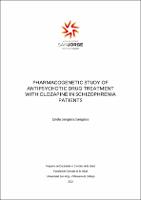Please use this identifier to cite or link to this item:
https://repositorio.usj.es/handle/123456789/913
| Title: | Estudio farmacogenético del tratamiento antipsicótico con clozapina en pacientes con esquizofrenia |
| Other Titles: | Pharmacogenetic study of antipsychotic drug treatment with clozapine in schizopherenia patients |
| Authors: | Sangüesa, Estela



|
| metadata.dc.contributor.affiliation: | Universidad San Jorge |
| Keywords: | Genética; Fármacos psicotrópicos; Psiquiatría; Psicofarmacología |
| Issue Date: | 2022 |
| Abstract: | La clozapina (CLZ) es el fármaco antipsicótico atípico de elección para la esquizofrenia resistente al tratamiento (ERT). Sin embargo, CLZ presenta ciertas barreras que hacen que su uso no esté tan extendido a pesar de sus notables ventajas. La presencia de un perfil farmacodinámico complejo y los efectos secundarios graves se encuentran entre estas barreras. Se debe considerar, además, que cerca del 40% de los pacientes no presentará una respuesta adecuada al fármaco. Los niveles plasmáticos de CLZ están asociados con la respuesta clínica, la cual puede estar influenciada por un elevado número de factores clínicos, demográficos o genéticos. Por ello, la medición de los niveles plasmáticos puede ayudar a monitorizar el cumplimiento farmacológico, y evaluar y prevenir los efectos secundarios, así como, conseguir individualizar la dosis. La presente tesis doctoral tiene como objetivo evaluar la utilidad de la farmacogenética en la predicción de la respuesta terapéutica, mediante la asociación de variables genéticas implicadas en el metabolismo y mecanismo de acción de CLZ con los parámetros farmacocinéticos ligados al tratamiento. Para ello, participaron pacientes con ERT en tratamiento con CLZ. Se analizaron los datos demográficos, parámetros analíticos, concentraciones plasmáticas y el perfil farmacogenético. Los niveles plasmáticos de CLZ se cuantificaron empleando cromatografía líquida en tándem con detección espectrofotométrica de masas. El genotipado fue determinado por PCR a tiempo real para los genes CYP1A2, CYP3A4, CYP3A5, CYP2C19, UGT2B10, ABCB1 y HTR2A. El genotipado del gen SLC6A4 se realizó por PCR convencional y el gen CYP2D6 mediante PCR alelo específica y long-PCR. Los resultados obtenidos confirmaron la influencia de factores clínicos, demográficos y genéticos en los parámetros farmacocinéticos. Se observó como el consumo de tabaco, el peso y la edad mostraron asociación con la relación concentración/dosis (C/D) para CLZ. En relación con la farmacogenética, variables genéticas en genes relacionados con la farmacocinética de CLZ (CYP1A2) parecen tener un efecto en la respuesta terapéutica de pacientes fumadores. En cuanto a la medicación concomitante, el uso conjunto con valproato junto con la presencia del genotipo GT para el gen UGT2B10 se asoció con un descenso de los niveles de norclozapina (NCLZ) y mayor ratio CLZ/NCLZ. Tras los hallazgos obtenidos, se puede concluir que es crucial considerar la integración de las pruebas farmacogenéticas y la monitorización de los niveles plasmáticos de CLZ para optimizar la terapia antipsicótica. |
| Description: | Clozapine (CLZ) is the atypical antipsychotic drug of choice for treatment resistant schizophrenia (TRS). However, despite the notable advantages of CLZ, its use is not significantly widespread due to certain barriers. Complex pharmacodynamic profile and severe side effects are among those barriers. In addition, it should be considered that around 40% patients will not present an adequate response to the drug. Plasma levels of CLZ are associated with clinical response, which may be influenced by several clinical, demographic or genetic factors. Therefore, the measurement of plasma levels could help to monitor pharmacological compliance, evaluate and prevent side effects, in order to tailor CLZ treatment for each patient. The aim of this doctoral thesis is to evaluate the usefulness of pharmacogenetics in predicting therapeutic response, by exploring genetic variables involved in the CLZ metabolism and mechanism of action with pharmacokinetic parameters associated with treatment. For this purpose, patients with TRS in treatment with CLZ participated in this doctoral thesis. Demographic data, analytical parameters, plasma concentrations, and pharmacogenetic profile were analysed. CLZ plasma levels were quantified using Liquid Chromatography-Tandem Mass Spectrometry. Genotyping was determined by real-time PCR for the CYP1A2, CYP3A4, CYP3A5, CYP2C19, UGT2B10, ABCB1 and HTR2A4 genes. Genotyping of the SLC6A4 gene was performed by conventional PCR and the CYP2D6 gene by allele-specific PCR and long-PCR. The results obtained confirmed the influence of clinical, demographic and genetic factors on the pharmacokinetic parameters. It was observed that tobacco consumption, weight and age showed an association with the concentration/dose (C/D) relationship for CLZ. In relation to pharmacogenetics, genetic variables in genes related to the pharmacokinetics of CLZ (CYP1A2) seem to influence the therapeutic response of smoking patients. Regarding concomitant medication, the use of CLZ with valproate with the presence of the GT genotype for the UGT2B10 gene was associated with a decrease in norclozapine (NCLZ) levels and a higher CLZ/NCLZ ratio. Based on the findings obtained, it could be concluded that it is crucial to consider the integration of pharmacogenetic tests and monitoring CLZ plasma levels to optimize antipsychotic therapy. |
| URI: | https://repositorio.usj.es/handle/123456789/913 |
| Appears in Collections: | Facultad de Ciencias de la Salud |
Files in This Item:
| File | Description | Size | Format | |
|---|---|---|---|---|
| Pharmacogenetic study of antipsychotic drug treatment with clozapine in schizopherenia patients.pdf | 6,29 MB | Adobe PDF |  View/Open |
This item is licensed under a Creative Commons License

